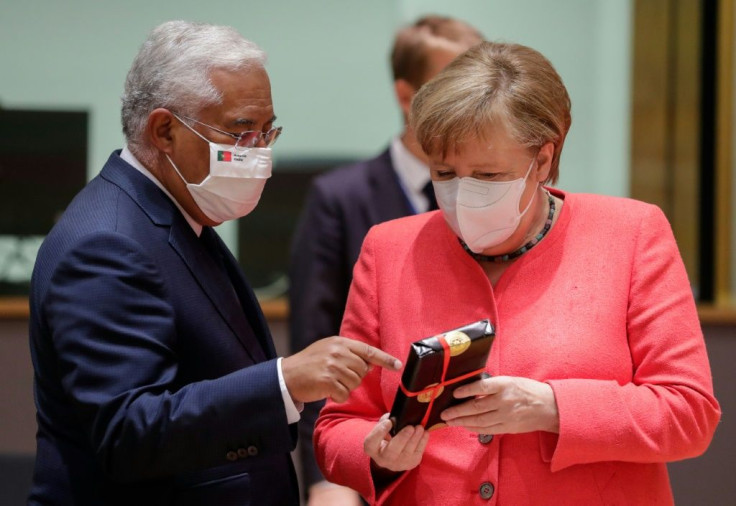EU Leaders Meet In Brussels To Negotiate Recovery Fund, But Merkel Doubts Deal Can Be Reached

KEY POINTS
- The recovery fund is designed to rescue European nations from the worst recession since World War II
- The talks have often pitted fiscally conservative northern European nations against the harder hit southern Euro states.
- Dutch Prime Minister Rutte said disbursements from the fund would have to be based on the extent of fiscal reforms
As all 27 European Union leaders gather in Brussels on Friday to hammer out details of a 750 billion euro ($855 billion) recovery fund to help their economies fight coronavirus, German Chancellor Angela Merkel expressed doubt that a deal will be reached this week.
The recovery fund is designed to rescue European nations from the worst recession since World War II.
“We’re entering these discussions with plenty of vigor, but I have to say that the differences remain very, very great, so I can’t predict whether we’ll reach an agreement here,” Merkel said before the start of a summit. “I expect very, very difficult negotiations.”
The summit, the first time in five months that EU leaders will meet face-to-face, arrives after weeks of negotiations between government officials of the many countries involved. The talks have often pitted fiscally conservative northern European nations like Denmark and the Netherlands against the harder hit southern Euro states like Spain and Italy.
One of the biggest obstacles diplomats face is how this large funding pie -- which will be financed by EU debt issuance -- will be sliced up and distributed.
At present, EU leaders are expected to discuss a plan under which 500 billion euros ($571 billion) of the EU-issued debt will be distributed as grants and subsidies – rather than loans. France and Germany support this arrangement, but some other European countries, including the Netherlands, Austria, Sweden, Denmark, are opposed to so much of the funding being issued as grants.
Dutch Prime Minister Mark Rutte said disbursements from the recovery fund would have to be based on the extent of fiscal reforms (on pensions, welfare and tax services) carried out by each member state -- and then unanimously approved by all countries in the bloc, rather than by a simple majority.
“If they want loans and even grants then it’s only logical that I can explain to the people in the Netherlands and other countries that in return those reforms have taken place instead of only assurances,” Rutte told Bloomberg.
Rutte also warned that the chances of reaching a deal was “less than 50%.”
European Council President Charles Michel also conceded the negotiations will be "very difficult"; while Estonian Prime Minister Juri Ratas said "we need a fast, strong and united response to the pandemic to kick-start the European economy.”
There is also some criticism of the vast size of the recovery fund, with some northern states suggesting it is too large an amount. But Italian Economy Minister Roberto Gualtieri told the Corriere newspaper that Rome "will fight hard not to modify" the structure of the fund.
Moreover, Hungary's Prime Minister Viktor Orban has vowed to derail the talks if any payments from the recovery fund are linked to a member nation's rule of law. Orban’s ruling Fidesz party has been criticized for cracking down on media, among other infractions.
"We could veto [the fund] because it needs a unanimous decision. Hungary could say no," Orban warned last week.
Luxembourg Prime Minister Xavier Bettel told CNBC that if the summit failed to reach an agreement this weekend, it will be “very bad” for Europe and the financial markets.
Spain's Prime Minister Pedro Sánchez warned: "If we delay the response, we delay the recovery and the crisis could get worse."
“My prediction is as good as yours, but the first possibility for a deal is sometime between Saturday night and Sunday morning,” tweeted Alexander Stubb, the former prime minister of Finland. “The more likely scenario is a couple of all-nighters and a deal on Monday.”
“Time is running out [on this deal],” warned Eric Schweitzer, president of German business lobby DIHK. “The markets now need a strong signal that a common, ambitious approach is possible.”
French President Emmanuel Macron said the summit represents a "moment of truth" for Europe.
© Copyright IBTimes 2025. All rights reserved.





















